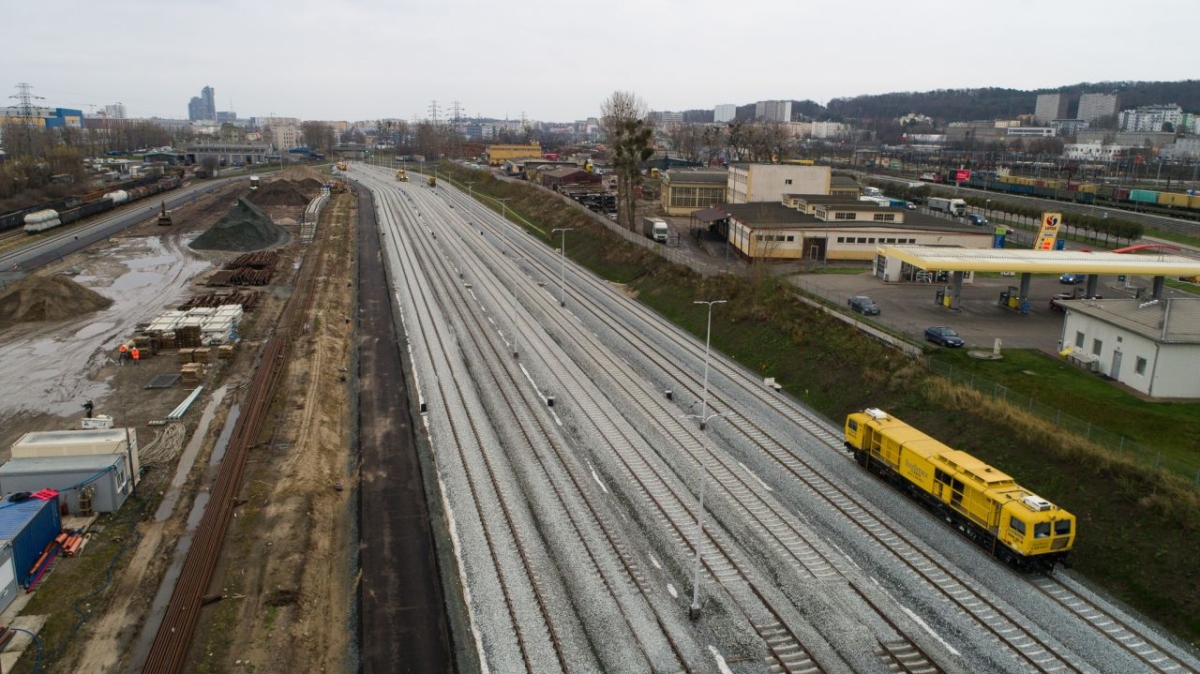
PKP Polskie Linie Kolejowe is implementing
successive stages of expansion and modernization of the railway
system in and around the Port of Gdynia. The huge investment is to
help in the functioning of, among others, intermodal transport and
significantly speed up and facilitate the handling of freight trains
in the port.
PKP Polskie Linie Kolejowe has completed the next stages of a large infrastructural operation at the Port of Gdynia. As part of the investment worth a total of over PLN 1.6 billion, a total of 115 km of tracks will be modernized and 332 turnouts will be built. One railway viaduct is ready, the second is under construction, and the third road viaduct along Pucka Street, stretched over ten tracks, is to be commissioned by the end of the year.
The whole investment is
complicated and huge. In some places, as many as 30 tracks were laid
side by side. Thanks to them and numerous turnouts, more trains will
be able to enter the port. The railway viaduct will be used for
trouble-free and collision-free exit of trains from container
terminals.
– It is a much needed
investment. The arrival and departure capacity of goods will increase
several times – says Andrzej Osipów, Director of the Northern
Region of PKP PLK. – Heavy trains with a length of 750 meters will
enter. There is also a Local Traffic Control Centre. The trains will
run at a speed of 60 km/h on the main tracks, and 40 km/h on the side
tracks.
The investment also included
a new public cargo hold and 13 underground retention tanks along with
a new sanitary and rainwater drainage network, whose task is to
ensure proper drainage of the area. The bridge over the Chylonka
River was also renovated.
– The huge reconstruction
of the Port Gdynia station is an investment that has not been seen in
the Port of Gdynia since the war. We can imagine what condition the
infrastructure was in as there were trees on some of the tracks. The
investment which modernizes all tracks, including main tracks,
holding tracks and sidings, increases the maneuvering possibilities
in the port area fourfold. After all, we have to maneuver the trains
around the port – comments Kazimierz Koralewski, Vice-President of
the Port of Gdynia Authority.
As Andrzej Osipów notes,
the Polish state, through the hands of PKP PLK, has invested heavily
in recent years in accessibility to ports in Gdynia and Gdańsk. The
works were financially supported from EU funds, from the CEF -
Connecting Europe programme.
However, the completion of
works at the Port of Gdynia and the improvement of the possibility of
maneuvering trains in the immediate hinterland of the port will not
solve all railway problems. Operators mainly complain about the fact
that freight trains have limited access to ports. Due to the small
number of lines and high density of trains - the same lines are also
used by passenger trains - freight trains often have to wait for long
hours, e.g. in Bydgoszcz, before they can even enter the Tri-City.
Port stakeholders have for years emphasized the need to modernize
line 201 from Bydgoszcz through Kościerzyna to Gdynia, which was
built during the Second Polish Republic. Many of them mentioned this
line as an absolutely necessary element for the development of
intermodal transshipments in Poland. Andrzej Osipów, director of the
Northern Region of PKP PLK, confirms that work on this line will
start this year.
– It will be a double-track, electrified line, passenger trains will run at 160 and 140 km/h, and freight trains at 120 and 100 km/h. This will be a comprehensive modernization of the line, which will allow in the future to bring and export goods to the port of Gdynia through Kościerzyna into the interior of Poland - says Osipów. The works are to be completed in 2027. – Once the Port of Gdynia will have new lands built on the sea, it will have this line at its disposal – adds Osipów.
The director notes that this
will be an even larger investment than those implemented in the ports
of Gdańsk and Gdynia. PKP PLK's investments in the Port of Gdynia
cost a total of about PLN 1.6 billion, the works already completed at
the Port of Gdańsk amounted to nearly PLN 1.3 billion.
– The line from Bydgoszcz
will cost much more. At the moment, we are still estimating the
funds, but it will be 173 km of lines in modern technologies - says
Andrzej Osipów.
Line 201 is awaited at the
Port of Gdynia as much as the Red Road, which is to enable more
efficient transport by trucks.
- It will allow to increase
transshipment in the port, and we plan to build an external port, and
thus increase the transshipment capacity of containers and more. We
are the largest grain port, and it is primarily the railway that
handles this type of cargo – notes Kazimierz Koralewski,
Vice-President of the Port of Gdynia.
In addition to faster,
easier, more efficient and safer handling of rail cargo, the Port of
Gdynia sees other opportunities in the investments implemented by PKP
PLK.
– PLK also electrify and
electronicize, i.e. they automate station control. Traffic will
become safer. Control from control centers and control over these
processes is something we will need in the future to launch
artificial intelligence, which will one day manage traffic in the
port - explains Kazimierz Koralewski.


